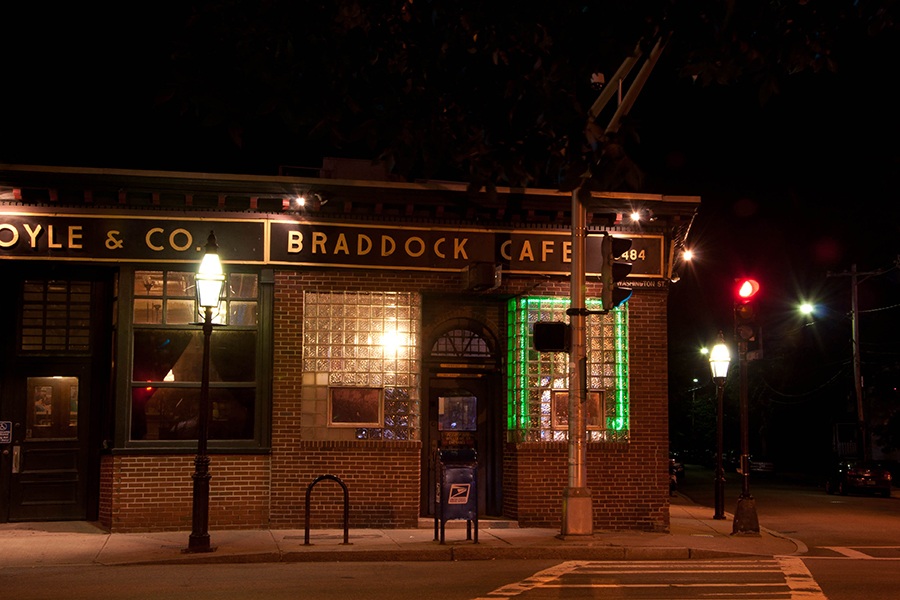Boston Needs to Reform Its Liquor Licensing Laws. Here’s How
It's the best way to protect more neighborhood bars like Doyle's from closing.

Doyle’s Cafe photo by Sarah Nichols on Flickr/Creative Commons
Like many, I was saddened to hear the news that Jamaica Plain’s Doyle’s Café will close. As an owner of a long-standing neighborhood bar, the Plough & Stars in Cambridge, I know well the time that Doyle’s owner, Gerry Burke, has put into his place, and can imagine the sadness he must have felt when he announced the death of a business his father and uncle owned before him.
The public has decried the loss, but no one has blamed Mr. Burke for his decision—nor should they. The bar’s liquor license is worth almost half a million dollars. And the building, which the Burke family owns and will now put on the market, is worth a handsome sum. The question before Mr. Burke was stark: Stay in business, work long hours, and muddle along, or secure his family’s future and move on.
The Boston Globe editorial board reacted strongly to the news. “What ultimately killed [Doyle’s]— or, more precisely, created an economic incentive for the owner to kill it himself—was the city’s archaic liquor licensing system,” it wrote. Mayor Marty Walsh echoed the sentiment when reflecting on the loss. Licenses, he and the Globe concluded, are too expensive, and drive businesses away from Boston’s neighborhoods and into its financial districts.
They’re right. The prohibitive cost of a liquor license creates an enormous barrier to entry and perverse incentives. It’s hard enough running a bar or restaurant in the Boston area. If you keep the cost of goods sold and labor down to 60 percent of revenue, which is not always easy for a small establishment, you’re left with 40 percent to cover all other expenses, including essentials such as insurance, utilities, rent, repairs, and, of course, yearly fees to maintain your license to serve alcohol. Many bars and restaurants must also service large debt they incurred to purchase their license in the first place; at 5 percent interest over a 10-year term, a $400,000 loan to buy a license in Boson will add another $4,242 of monthly expenses—a daunting obstacle to profitability.
Of course, the numbers work for some. There are many successful publicans and restaurateurs who originally purchased a liquor license at a steep price. But the high buy-in favors those with deep pockets and puts loan recipients on the razor’s edge from the moment they tap their first keg. This is especially true for bars located on the outskirts of the city. Although few people in Jamaica Plain will pay $10 for a pint of Guinness or $30 for an entree, lawyers and businessmen likely will in the Seaport District, where the Doyle’s liquor license will be transferred and used by Davio’s.
While the Globe’s criticism of Boston’s licensing system is spot-on, its proposed prescription—scrapping licenses in favor of a non-transferable permit system—is short-sighted and unfair. An end to the current rules would have a devastating effect on independent bar owners who spent (and borrowed) vast sums to purchase liquor licenses. The value of their greatest asset would collapse, and they’d be forced to run at a substantial competitive disadvantage against newly opened bars and restaurants that weren’t required to pay hundreds of thousands of dollars for the right to serve alcohol.
The Globe does obliquely refer to the drawbacks of a permit system, calling a transition away from licenses “tricky,” and says that phasing out transferable licenses over time might be one way to ease the pain. It then concludes, however, that licensees assumed the risk that licenses would retain their value and argues that Mayor Walsh’s request for 184 new licenses in Boston—a 15 percent increase—is “a big step in the right direction.”
The right direction for whom? While it’s true that current licensees took on the risk that the government would not intentionally devalue their licenses, the city of Boston encouraged and applauded that risk, and as a result Greater Boston has benefited for generations through wonderful meals, drinks, and nights out on the town. Any new plan that involves devaluing existing licenses in Boston will place existing neighborhood bars throughout the city at a severe competitive disadvantage.
What’s the solution? As a starting point, any increase in the number of licenses should occur very gradually so that pre-existing licenses don’t lose all of their value. Moreover, the city should implement some measures to level the playing field between beloved institutions that paid for their license and newcomers who benefit from any licensing reform. This isn’t as complicated as it sounds. The city could make a one-time, direct payment to pre-existing license-holders to account for some of the harm that would result from a changed license policy. If the city isn’t prepared to draw from its own coffers, it could temporarily exempt pre-existing businesses from paying the annual fees they’re now charged to keep their liquor licenses active. At the same time, annual license fees paid by newly opened bars could be increased for a period of years, with some or all of the additional proceeds set aside for pre-existing owners to level the playing field.
One thing is clear: As Boston flies headlong into the future, it should not forget the very places that make its present great.


